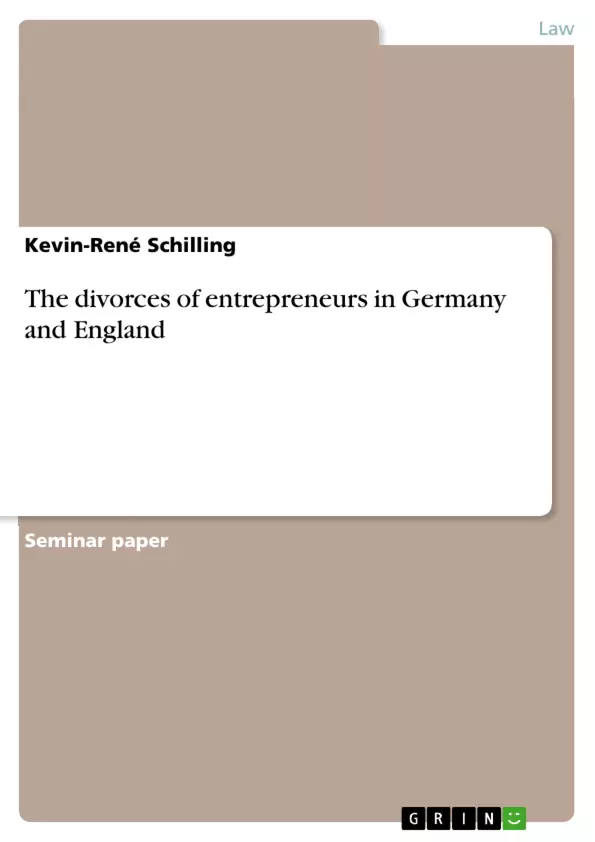What have many self-employed in common? Often the answers are: They have a lot of money. They have expensive homes, cars, and watches. They are constantly on vacation. That’s all true. But another similarity is that many self-employed have a divorce. However, they are not alone. About 81 million people live in Germany. Nearly 50 percent of those are married. If one now looks at the divorces, the rate was 43.06 percent in 2014. In England, the situation is more or less the same. Today, there are around 53 million people. The divorce rate was nearly 47 percent in 2009. For the avoidance of doubt, a divorce of an entrepreneur is not a special type of divorce. However, it can become a real threat to the continued existence of a company.
Table of Contents
- What have many self-employed in common?
- Divorce of an entrepreneur is not a special type of divorce
- Economic Law
- Family Law
- Example of an entrepreneur from Germany
- Divorce in Germany
- Divorce in England
- Division of Assets in Germany
- Division of Assets in England
- Alimony in Germany
- Alimony in England
- Pension Rights Adjustment in Germany
- Pension Rights Adjustment in England
- Joint Custody
- Costs of a Divorce
- Remuneration Models in England
- Experts in Germany
- Experts in England
Objectives and Key Themes
This paper aims to compare the similarities and differences between England and Germany concerning economic law, company law, and family law through the lens of entrepreneurs facing divorce. The analysis focuses on a comparative approach, examining two specific cases: an entrepreneur from Germany and an independent investment banker from London.
- Divorce proceedings in Germany and England
- Division of assets in divorce cases
- Alimony and pension rights adjustment
- Cost factors associated with divorce proceedings
- Expert involvement in complex financial cases
Chapter Summaries
- This chapter introduces the topic of divorce among entrepreneurs in Germany and England, highlighting the potential financial consequences for businesses.
- This chapter defines economic law and family law, outlining their respective roles in the legal framework of Germany and England. It sets the stage for a comparative analysis.
- This chapter presents a specific case study of a German entrepreneur facing his third divorce. The chapter explores the legal implications of his marital status, particularly in relation to his two companies.
- This chapter delves into the divorce process in Germany, discussing the legal requirements, timeframes, and factors that influence the outcome of a divorce.
- This chapter examines the divorce process in England, contrasting it with German procedures and highlighting key differences in grounds for divorce and legal requirements.
- This chapter focuses on the division of assets in divorce proceedings in Germany, examining different marital property regimes and their implications for the division of wealth.
- This chapter compares the division of assets in divorce proceedings in England with the German system, emphasizing the importance of equality and the role of individual factors in asset distribution.
- This chapter discusses alimony rules in Germany, outlining the factors that determine the amount of maintenance payments and the difficulty in predicting specific outcomes.
- This chapter contrasts alimony rules in England with those in Germany, highlighting the possibility of the English judge rejecting alimony payments based on asset division.
- This chapter explores the pension rights adjustment process in Germany, explaining how pension rights accrued during the marriage are divided upon divorce.
- This chapter compares the pension rights adjustment in England with Germany, emphasizing the discretionary nature of the adjustment and the role of equity considerations.
- This chapter briefly discusses the concept of joint custody of children in both Germany and England, highlighting the similarity in both countries.
- This chapter examines the cost of divorce proceedings in Germany and England, focusing on legal fees, court costs, and the potential for additional compensation agreements.
- This chapter delves into the complex remuneration models for independent investment bankers in England, highlighting the need for expert consultants in financial cases.
- This chapter discusses the role of experts in divorce proceedings involving complex financial situations in Germany, highlighting the costs associated with expert assessments.
- This chapter compares the use of experts in complex financial divorce cases in England with the German system, highlighting the costs and complexities involved.
Keywords
This paper examines divorce proceedings in Germany and England, specifically focusing on the legal and financial implications for entrepreneurs. Key concepts include economic law, family law, divorce procedures, asset division, alimony, pension rights adjustment, expert involvement, and the complexities of financial cases in divorce proceedings.
Frequently Asked Questions
Why is a divorce particularly risky for an entrepreneur?
A divorce can become a real threat to the continued existence of a company due to the potential division of business assets and high financial settlements.
What are the divorce rates in Germany and England?
In 2014, the divorce rate in Germany was approximately 43.06%, while in England, it was nearly 47% in 2009.
How does the division of assets differ between Germany and England?
The paper compares marital property regimes in Germany with the English system, which emphasizes equality and judicial discretion in asset distribution.
What is "pension rights adjustment"?
It is the process of dividing pension rights accrued during the marriage, which is handled differently in Germany (statutory) compared to England (discretionary/equity-based).
Why are experts often needed in entrepreneurial divorces?
Experts are required for complex financial assessments, such as valuing companies or analyzing intricate remuneration models for investment bankers.
Are there differences in alimony rules?
Yes, German alimony is based on specific factors and is often hard to predict, while English judges may reject alimony if the asset division is deemed sufficient.
- Quote paper
- Kevin-René Schilling (Author), 2016, The divorces of entrepreneurs in Germany and England, Munich, GRIN Verlag, https://www.hausarbeiten.de/document/1296655


